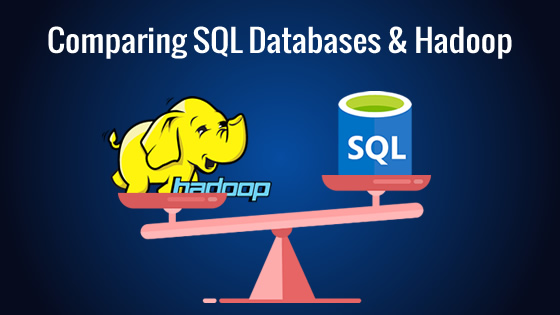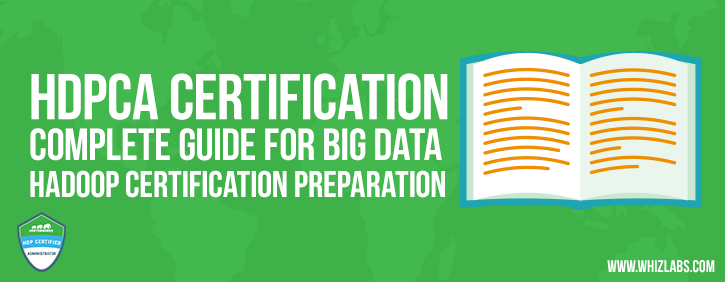RDBMS is in the data processing dictionary for a long time and is the basis of SQL. RDBMS is a strong database that maintains bulk data and manipulated it efficiently using SQL. SQL stands for Structured Query Language, it is a standard language to manipulate, retrieve and store a significant amount of data in a database. However, with the increase of storage capacities and customer-generated data processing this information within a timeline becomes a question.
Hadoop as one of the top Big data tools takes the edge over SQL in the above context. This java based open source framework is a distributed file system which offers more general paradigm to the users for processing both structured and unstructured data. Not to mention data of enormous volume, instead ‘big data’.
Hadoop Vs SQL Database
Hadoop is replacing RDBM in most of the cases, especially in data warehousing, business intelligence reporting, and other analytical processing. It becomes a real challenge to perform complex reporting in these applications as the size of the data grows exponentially. Along with that, there is customers demand complex analysis and reporting on those data. So, Hadoop vs SQL database is a pertaining question when you are going to select the data storage and processing framework for your next project.
New to Hadoop? Expand your Hadoop knowledge by understanding these 20 most important Hadoop terms.
Let’s have insights on Hadoop vs SQL database facts through this blog.
Supported Data Format
As mentioned in the beginning, the first and foremost point when we talk about Hadoop vs SQL database is the volume and format of the data they process. SQL only work on structured data, whereas Hadoop is compatible for both structured, semi-structured and unstructured data.
SQL is based on the Entity-Relationship model of its RDBMS, hence cannot work on unstructured data. On the other hand, Hadoop does not depend on any consistent relationship and supports all data formats like XML, Text, and JSON, etc.So Hadoop can efficiently deal with big data.
Hadoop vs SQL database – of course, Hadoop is better.
Capability of Processing Data Volume
Data volume is the quantity of data stored and processed during an enterprise application. SQL works better on low volume of data (Gigabytes). But in case of large data, for example for Terabytes and Petabytes, SQL fails to give the expected results.
On the other hand, Hadoop is developed for big data. Hence, it can efficiently process and store a massive amount of data effectively which is the need of the hour.
Is Hadoop Faster than SQL?
Let’s answer based on data processing techniques of the two.
Hadoop is a distributed computing framework which has its two core components – Hadoop Distributed File System (HDFS) which is a Flat File System and MapReduce for processing data. Hadoop doesn’t support OLTP (Real-time Data processing). Hadoop supports large-scale Batch Processing (OLAP) mainly used in data mining techniques. Using OLAP, you can execute very complex queries along with aggregations. Data processing time in Hadoop varies based on the volume of data and sometimes can take several hours.
On the other hand, RDBMS supports OLTP (Real-time data processing) which does not support Batch Processing. Due to highly normalized data, SQL performs fast data processing.
Hence, Is Hadoop faster than SQL? Probably the answer is ‘no.’
Planning to become a Hadoop certified? Here is the comprehensive list of the best Hadoop certifications in 2018.
ACID Property
With SQL, you will get the support of RDBMS ACID properties – Atomicity, Consistency, Isolation, and Durability. However, in Hadoop, this is not out of the box. So you have to code all the scenarios to implement commit or rollback during a transaction.
Hadoop vs SQL database – of course, SQL is better than Hadoop on this point.
Data Storing Technique
A crucial principle of relational databases is data stores in tables containing relational structure characterized by defined row and columns. Moreover, data is stored in interrelated tables. In spite of the fact that the relational display has excellent formal properties, numerous cutting-edge applications manage data types that don’t fit well into this model. Content reports, pictures, and XML documents are mainstream cases.
In Hadoop, a basic data can begin in any shape. However, in the long run, it changes into a key-value pair. Because once the data enters into Hadoop, it is replicated across multiple nodes in the Hadoop Distributed File System (HDFS). It may seem like a waste of storage space, but it’s the primary reason behind Hadoop’s massive scalability.
Note: If you are preparing for a Hadoop interview, we recommend you to go through the top Hadoop interview questions and get ready for the interview.
The Way of Data Mapping
In case of SQL operations like a write operation from one table to another for data mapping, we need to know the information beforehand. The information here indicates the schema of the mapping tables. Hence, it is a schema on write.
On the other hand in Hadoop when we perform write operation on data, i.e., on the Hadoop Distributed File System we do not need to follow any rules. Similarly, when we want to read the data, we need to code. It is schema on reading.
Architecture
Hadoop is one of the top Big Data tools, meant for Big Data solution, and usually, Hadoop architecture consists of an unlimited number of servers. Now let’s say that one of those servers gets down or faces issues while processing data. In this case, the data processing will not hold. Because every time data gets replicated in each data blocks, hence data processing continues without any interruption and maintains consistency. As a result, Hadoop architecture is highly reliable for data.
On the other hand, for SQL you need complete consistency across all the systems before it releases anything to the user. This is called a two-phase commit.
Both the approaches have its pros and cons. The eventual consistency strategy in Hadoop is a realistic approach. On the other hand, the two-phase commit methodology for relational SQL databases is suitable for transaction management. Hence, Hadoop vs SQL database does not hold well at this point.
Preparing for HDPCA Certification? Here is the complete guide on how to prepare for HDPCA Certification!
Hadoop vs SQL Performance
One of the significant parameters of measuring performance is Throughput. It is the total volume of output data processed in a particular period and the maximum amount of it. SQL database fails to achieve a higher throughput as compared to the Apache Hadoop Framework.
However, there is another aspect when we compare Hadoop vs SQL performance. This is Latency. Hadoop cannot access a particular record from the data set very quickly. Hence, it has very low latency. On the other hand, you can retrieve information from data sets faster using SQL.
Hadoop vs SQL database – Hadoop performs better considering a large set of data.
Scalability
With RDBMS you can add more hardware like memory, CPU in the cluster to scale up the machine. It is known as vertical scalability or scaling.
In Hadoop architecture, you can add more machines in the existing cluster. This is known as horizontal scalability or scaling out. Moreover, in Hadoop, there is no single point of failure. Hence, it is fault tolerant.
Hadoop vs SQL database – of course, Hadoop is more scalable.
Bottom Line
Difference between MySQL and Hadoop or any other relational database does not necessarily prove that one is better than other. Hence, Hadoop vs SQL database is not the answer for you if you wish to explore your career as a Hadoop developer. Understand the technology Hadoop, and you will find the solution yourself. Hence, walk on the learning path of Hadoop.
Whizlabs bring you the opportunity to go through the market leading certification guides from Cloudera (CCA -131) and HortonWorks (HDPCA).
Happy learning with us!
- Top 25 Fresher Java Interview Questions - March 9, 2023
- 25 Free Practice Questions – GCP Certified Professional Cloud Architect - December 3, 2021
- 30 Free Questions – Google Cloud Certified Digital Leader Certification Exam - November 24, 2021
- 4 Types of Google Cloud Support Options for You - November 23, 2021
- APACHE STORM (2.2.0) – A Complete Guide - November 22, 2021
- Data Mining Vs Big Data – Find out the Best Differences - November 18, 2021
- Understanding MapReduce in Hadoop – Know how to get started - November 15, 2021
- What is Data Visualization? - October 22, 2021



Worthful Azure Tutorial Blog. Appreciate a lot for taking up the pain to write such a quality content on Azure Training.